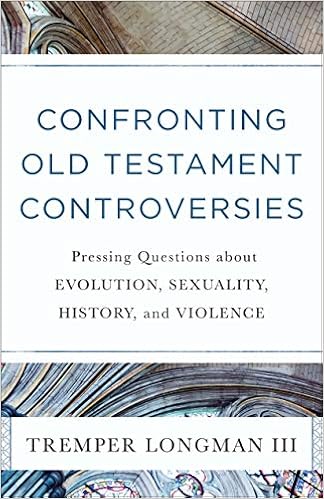Many Christians tend to be afraid of the Old Testament. Typical reasons include its confusing nature or irrelevance. These lead to a deeper issue: a distrust that the Old Testament is capable of addressing modern issues, especially when it seems to be rife with controversy. This is the problem that Tremper Longman III seeks to address in Confronting Old Testament Controversies: Pressing Questions about Evolution, Sexuality, History, and Violence (Baker Books, 2019). Longman, a respected Old Testament scholar, presents four of the most controversial subjects regarding the Old Testament and its relevance to life—evolution, homosexuality, historicity, and divine violence—and makes a biblical, theological, and historical case for each issue.
Longman’s writing is not for the faint of heart. It is heavily academic in nature, requiring a basic knowledge of the literature and state of Old Testament scholarship. He drops large theological and biblical words and expects the reader to understand him. The occasional personal story peppered among the academic weeds assists in this book’s readability. For those who are capable of following complicated arguments, this book is a valuable read. And perhaps that is Longman’s intention—not to provide a quick and easy reference but an in-depth evaluation for the careful scholar. On each issue, Longman takes a stance, which is typically traditional/conservative with latitude and grace toward opposing views. Thus, while not all will agree with his conclusions, he makes a strong argument throughout.
This book would make an excellent addition for a biblical scholar, ethics student, or interested layperson. To be sure, it is quite dense, but it is worth the read and necessary for entering into contemporary issues debates.
(A complimentary review copy was given in exchange for an honest review.)
Longman’s writing is not for the faint of heart. It is heavily academic in nature, requiring a basic knowledge of the literature and state of Old Testament scholarship. He drops large theological and biblical words and expects the reader to understand him. The occasional personal story peppered among the academic weeds assists in this book’s readability. For those who are capable of following complicated arguments, this book is a valuable read. And perhaps that is Longman’s intention—not to provide a quick and easy reference but an in-depth evaluation for the careful scholar. On each issue, Longman takes a stance, which is typically traditional/conservative with latitude and grace toward opposing views. Thus, while not all will agree with his conclusions, he makes a strong argument throughout.
This book would make an excellent addition for a biblical scholar, ethics student, or interested layperson. To be sure, it is quite dense, but it is worth the read and necessary for entering into contemporary issues debates.
(A complimentary review copy was given in exchange for an honest review.)

Comments
Post a Comment